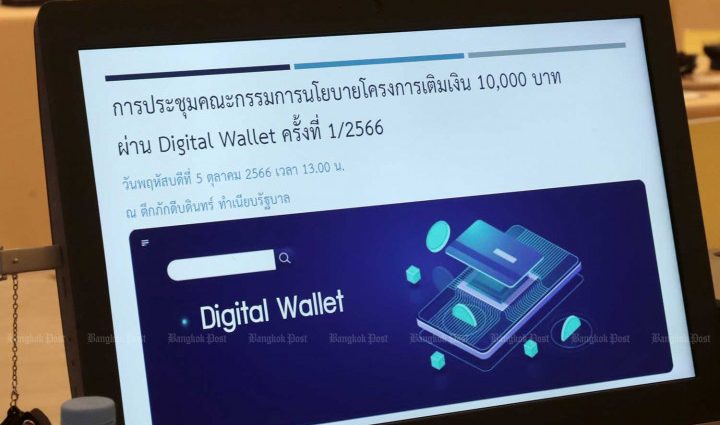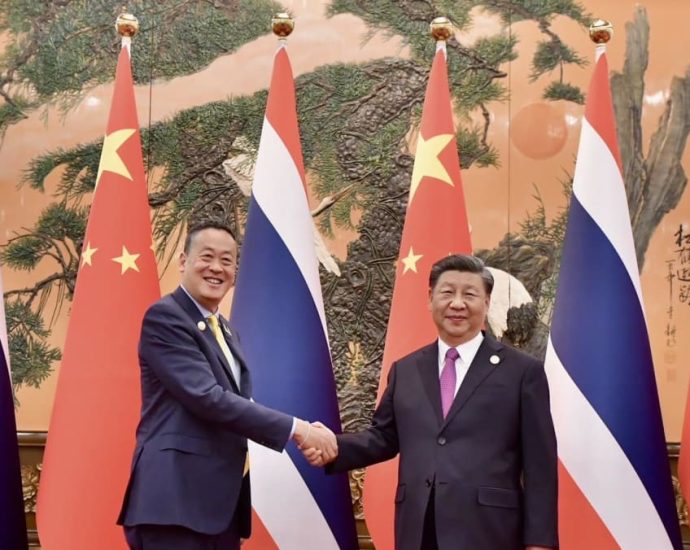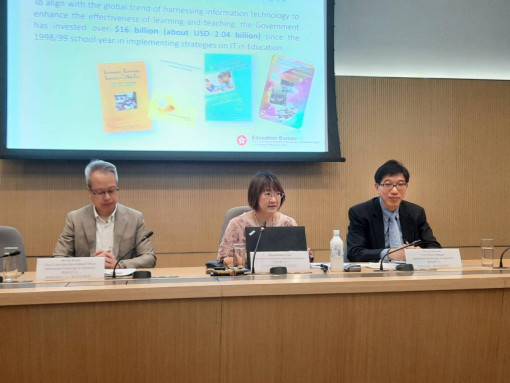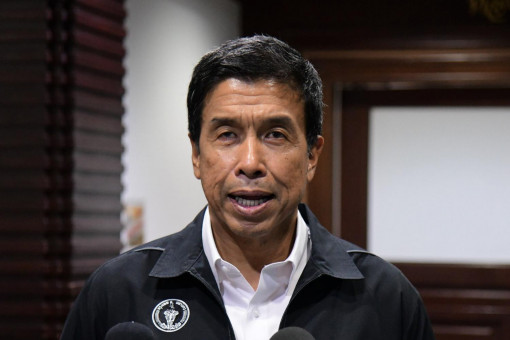Govt shrugs off wallet criticism
Cites study which puts growth rate at up to 4.73%
PUBLISHED : 30 Oct 2023 at 05:04

The government on Sunday shrugged off calls for it to rethink its intention to push ahead with the 10,000-baht digital money handout scheme, saying details of the project could be adjusted and fine-tuned but not its core principle of being intended as a tool to kick-start the economy.
The economy has been sluggish for nine to 10 years and Thailand is critically in need of a powerful mechanism to stimulate it, or the country will end up facing a dim economic outlook in the years to come, said Deputy Prime Minister Phumtham Wechayachai.
Before the 2014 military coup, which ousted the Yingluck Shinawatra administration, the economy of the northeastern province of Udon Thani, for instance, was booming, with a huge number of people crossing the border from neighbouring Laos, he said.
The economy has stagnated ever since the coup, while many small- and medium-entrepreneurs have gone out of business, he said. The government has referred to the nine years of stagnation which followed as Thailand’s “lost decade”.
As for the estimated 560 billion baht fund required for sponsoring the digital wallet scheme, if it really needs to be obtained by means of borrowing, he said, that shouldn’t be a problem.
The previous government borrowed a trillion baht and that caused no issues.
Nor would this loan, if it was needed, as long as the money was strictly spent on stimulating the economy as it was intended, he said.
He also welcomed the move by the National Anti-Corruption Commission (NACC) to set up a panel to study the government’s handout scheme and gather opinions from experts and the public.
Critics of the scheme say the economy is no need of an injection of cash in such a fashion and say the money could be better spent elsewhere. Some has also bought means-testing of the giveaway, to ensure the money goes only to those who need it.
Mr Phumtham said the NACC’s role will actually help ensure the project’s implementation is in line with the law, which would be good for the government.
Prime Minister Srettha Thavisin on Sunday promised supporters who greeted him in Udon Thani during a visit on Sunday that the digital money handout would come in February as planned.
Government spokesman Chai Wacharonke, meanwhile, cited findings from a study conducted by an economic team led by economist Suwit Sapwitthayasiri, to support the policy. The study said it “has a good potential to spur economic growth at most from 4.73% next year to 5.54% in 2027.”
Commentary: Can Thailand effectively balance its relations with China and the US?
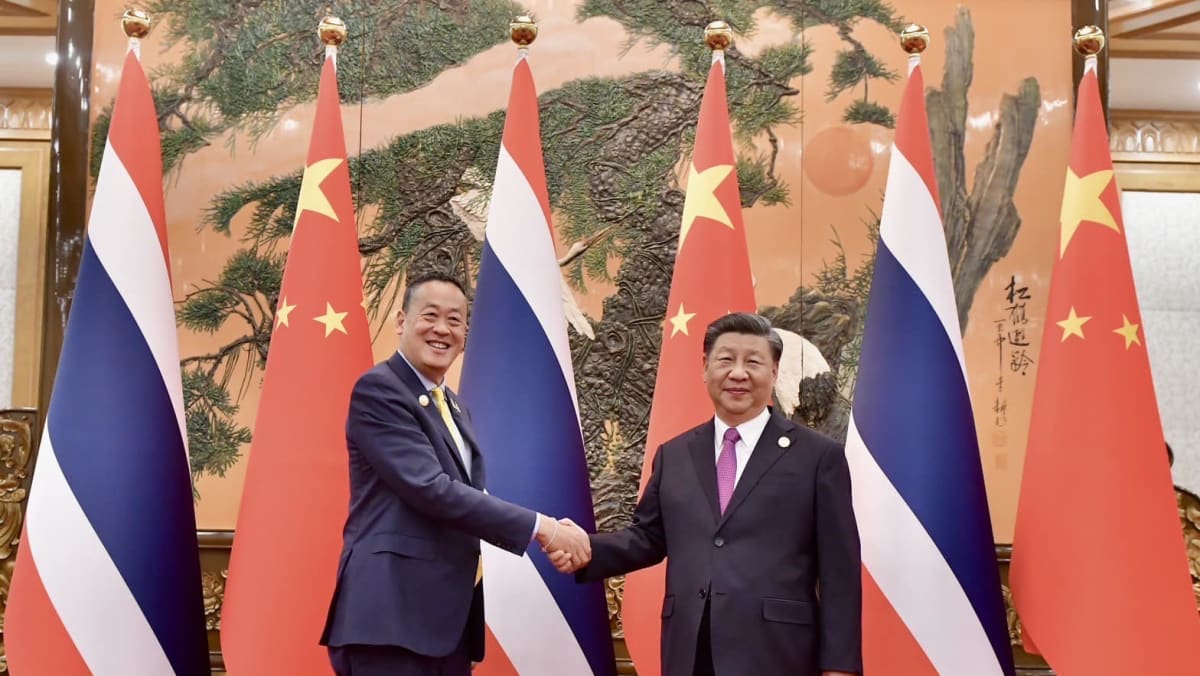
BLOOD IS THICKER THAN WATER?
China and Thailand have a long history of close economic ties, with diplomatic relations dating back to July 1975.
During Mr Srettha’s recent trip to China, Thailand signed a slew of bilateral agreements covering various sectors, including infrastructure, trade and cultural exchanges.
One of the key outcomes of the visit was the focus on green initiatives and high-speed rail projects.
Thailand’s commitment to environmental conservation is evident, and the country seeks Chinese investments to realise these goals. China’s experience in high-speed rail development makes it a valuable partner for Thailand’s ambitious rail projects.
The positive aspects of this close relationship with China are clear. Chinese investments in Thailand’s green initiatives can significantly speed up the country’s transition to a more sustainable and eco-friendly economy, reducing carbon emissions and preserving Thailand’s natural beauty and resources.
Furthermore, support for high-speed rail projects is crucial for enhancing Thailand’s infrastructure, connectivity and transportation network. Efficient rail systems can boost economic development, improve logistics and stimulate both domestic and international trade.
While China and Thailand may resemble brothers in the context of international diplomacy, siblings can sometimes have complex relationships. The strengthened partnership with China is not without its challenges.
Mr Srettha has made it clear that Thailand’s economy needs a significant boost to increase growth, alleviate household debt and improve livelihoods. The economy grew just 1.8 per cent in the second quarter from a year earlier, while household debt has risen to 90.6 per cent of gross domestic product.
China’s economy is also under pressure, with a range of challenges from a property crisis, high youth unemployment and US-China tensions over trade. Its own economic slowdown might hinder its ability to invest as robustly as anticipated. As China is one of Thailand’s major trade and investment partners, its economic health directly affects Thailand. A slowdown in China could have adverse effects on the Thai economy, leading to reduced exports and potentially impacting the livelihoods of the Thai people.
Additionally, Thailand’s closer alignment with China might raise concerns in the United States, a key ally and trading partner. The US is keen on maintaining its influence in the region, and Thailand’s growing ties with China could be viewed with suspicion. Managing this can be particularly challenging against the backdrop of strategic competition in US-China relations.
Hong Kong, Thailand to co-promote tech in schools

Hong Kong is ready to work with Thailand to promote the use of educational technology to help students learn more effectively and allow teachers to create customised lessons and increase classroom participation.
The venture was raised at Hong Kong’s recent Edtech Month Summit 2023, a month-long programme of activities on education technology. It included discussion panels on how technology can reshape and contribute to education systems, not only in Hong Kong but at the global level.
Katherine Choi, Principal Assistant Secretary (Education Infrastructure) at the Hong Kong Special Education Bureau, who is responsible for promotion of educational technology, said Thailand could follow in Hong Kong’s footsteps in the implementation of Information Technology in education.
Ms Choi was speaking on how Hong Kong has implemented education technology systematically and effectively.
“We welcome collaboration opportunities with other countries including Thailand on EdTech. Hong Kong Special Administrative Region [HKSAR] and the Government’s Economic and Trade Office in Bangkok could help communication on both sides,” she said.
She said Hong Kong’s multi-faceted approach to IT in education, through working on infrastructural and mobile hardware, as well as software such as training, peer group support, promotion of information literacy, and through involvement of different stakeholders, may serve as a good reference for Thailand in mapping out its focus of work on this front.
Ms Choi said that to align with the global trend of harnessing information technology to enhance the effectiveness of learning, the HK government had invested over about US$2.04 billion (about 73.7 billion baht) since the 1998/99 school year in implementing strategies on IT education.
Since then, the Hong Kong government has been trying to advance school infrastructure such as providing Wifi support in govt’s funded public schools.
“We have established Wifi campus for all public-funded schools [about 1,000 schools] in Hong Kong, which allows students to use mobile computing devices for e-learning anywhere on campus. Each school now, on average, owns over 200 mobile computer devices for learning and teaching,” she said.
Furthermore, the Hong Kong government has provided the e-learning subsidies under the “Composite Information Technology Grant (CITG)”.
She said that each school is disbursed with CITG annually ranged from US$33,900 to $110,600 in the 2022/2023 school year depending on the school type and number of classes.
“Schools may deploy the recurrent grant to subscribe Wifi services; purchase and enhance different software and hardware for online teaching; and strengthen IT staffing support,” she added.
She said the Hong Kong government also had the Information Technology Staffing Support Grant (ITSSG), in which each school would be disbursed with a recurrent sum of $42,500 a year and could deploy the money to strengthen its IT staffing support.
To strengthen teachers’ knowledge of technology, the Hong Kong government has launched the Professional Development Programmes (PDPs) that covers the topic on applying various emerging technologies in learning and teaching.
They include pedagogy, Stem (Science, Technology, Engineering and Mathematics) related subjects, e-Leadership, technology, information literacy and blended learning. The PDPs offered over 300 training events with over 20,000 participants per year, she said.
Ms Choi said while technology had made great contributions to children’s development, it also had exposed Hong Kong’s children to dis/misinformation, internet addiction and cyberbullying.
“Many children who have suffered from cyberbullying in Hong Kong have found the solution to be to delete their [social media] accounts to avoid attacks. So, we need to prepare our students to become literate in IT,” she added.
The Education Bureau launched the Information Literacy for Hong Kong Students framework to ensure information and technology literacy among their students. It encompasses nine literacy areas, which aim to develop students’ knowledge, skills, and attitudes.
Those are: using technology effectively; identifying and defining a need for information; locating information; evaluating information; extracting information and presenting new ideas; applying IT skills to produce content, recognising reliable sources and the roles and functions of information providers; and emerging ethnical issues arising from advanced IT.
The education bureau has also strengthened the teachers’ information literacy through PDPs through offering both basic and advanced levels of information literacy, which aims to train and enhance teachers’ understanding of emerging information technologies, and aptitude in planning, implementing and evaluating the information technology curriculum.
“The Education Bureau has been providing teachers with e-learning resource kits, and collaborating with different government departments and NGOs,” she said.
“For example, we have got assistance from Hong Kong police in providing the information on scams, intellectual properties and fake news to produce teaching materials to assist schools in teaching information literacy to students.”
Rare gaur seen in north
PUBLISHED : 30 Oct 2023 at 04:30

MAE HONG SON: A camera trap caught a gaur in the Salawin Wildlife Sanctuary in this province bordering Myanmar on Oct 8. It is the first gaur seen there in 37 years, according to the chief of the sanctuary.
Arkhom Boonnontae said the footage showed the bull turning up at 3.01am. It was the first gaur seen in the sanctuary since 1986, he said.
The gaur is a wild animal that is very rarely seen in the north, he said.
The IUCN lists the gaur as an endangered species. It is also a pro- tected animal under the Wild Animal Conservation and Protection Act, Mr Arkhom said.
Salawin Wildlife Sanctuary is the only reserve forest in the north where a gaur has been spotted, he said.
HK firms mull local expansion

PUBLISHED : 30 Oct 2023 at 04:30
Hong Kong companies are showing interest in having manufacturers and logistic firms based in Thailand, according to Thai trade representative Nalinee Taveesin.
Speaking after meeting Ronald Ho, director of the Hong Kong Trade Development Council’s Southeast Asia and South Asia in Bangkok yesterday, Ms Nalinee said Hong Kong has been Thailand’s ally in trade, investment and tourism for a long time.
The meeting was a follow-up to Prime Minister Srettha Thavisin’s visit to Hong Kong to meet potential investors early this month. The meeting also focused on exchanging information and tightening trade relations, she said.
A Covid-19 abated, Hong Kong became interested in expanding its market to Asean, including Thailand, with 30 companies looking to invest and set up production bases and logistics systems in the kingdom, she said.
This cooperation will help Thai businesses, particularly small and medium-sized enterprises and start-ups, acquire channels for product distribution and knowledge development in various fields, including e-commerce.
During the meeting, Mr Ho also invited Mr Srettha to attend the Asian Financial Forum in Beijing in January.
Ms Nalinee also met Kevin Yang, chairman of the Hong Kong Fashion Designers Association, to discuss ways to promote Thai silk in the world market.
Mr Yang suggested Thailand present stories of its silk to the world to show that it is not only used to make clothes but also decorations and furniture through exhibitions.
The design of Thai silk dresses should also reduce the formality to make them more accessible to teenagers, he said.
“Hong Kong is a bridge connecting China with the rest of the world,” Ms Nalinee said. “Hong Kong is also known as a financial and investment hub and a centre of international trade, goods and human resources.”
She added that last year, the trade value between Thailand and Hong Kong was worth about US$11.8 billion.
Yearly cool season set to start

PUBLISHED : 30 Oct 2023 at 04:30
This year’s cool season is expected to arrive later this week, about two weeks later than usual, and it is forecast to be warmer than usual due to volatile weather conditions coupled with the impact of El Niño, according to the Meteorological Department.
Normally, Thailand enters its colder season by the middle of October, said the Meteorological Department.
As for this year, a “moderate” cool spell is forecast to arrive in upper Thailand tomorrow, lasting until next Monday, and is considered a sign of the beginning of the change in climate, said the department.
The Northeast region, for instance, will experience a temperature drop and although it cannot yet say goodbye to rain and sporadic thunderstorms, precipitation is expected to decrease significantly.
The coldest period in the kingdom is expected to begin early next month and last until late January, with the average temperature in the upper part of the country being predicted to be between 21 and 22 degrees Celsius, or approximately 1.5C higher than the average temperature recorded in last year’s cold season.
The lowest temperatures in the North and the Northeast will be between 9 and 1C, while the lowest in Bangkok are expected to be 17 to 18C and between 15 and 16C in the surrounding provinces this year.
Some frost on the ground may appear at certain points throughout the cold season on the mountaintops in the upper areas of the country.
BMA to build new hospital in Sai Mai
PUBLISHED : 30 Oct 2023 at 04:30

City Hall is planning to build a hospital in Sai Mai district, after Bangkok governor Chadchart Sittipunt found the capital’s second-most populous district is not served by any hospitals affiliated with Bangkok Metropolitan Administration.
Mr Chadchart visited the area yesterday with Rattikan Kaewkerdmee, a councillor representing Sai Mai district, district chief Sombat Kanokthipwan and other officials.
The district has 209,556 residents, second only to Klong Sam Wa district. However, since there are no BMA-affiliated hospitals in the district, most residents in the area are referred to Bhumibol Adulyadej Hospital, which is overseen by the Directorate of Medical Services under the Royal Thai Air Force.
In addition to a hospital, which will be built on a 20-rai plot of land donated by a resident, City Hall will also develop two public health centres to serve the area.
“The development won’t only benefit the district’s residents, but also those living in neighbouring Klong Sam Wa district. The districts have a combined population of about 400,000, similar to a province,” he said.
Mr Chadchart also said BMA will consider a number of new measures to deal with the area’s traffic congestion, including more park-and-ride facilities to promote the use of public transport and expanding the area’s bicycle lanes.
BMA is also working to tackle flooding at 14 areas in Sai Mai district, said the governor, adding Vacharapol and Sai Mai roads will be further upgraded to prevent floods after heavy rain.
Public ‘satisfied’ with PM despite trips abroad

PUBLISHED : 30 Oct 2023 at 04:30
The majority of Thais are satisfied with Prime Minister Srettha Thavisin’s performance, despite his frequent trips abroad in his first two months in office, a survey conducted by the National Institute of Development Administration (Nida) found.
The survey, also known as the Nida Poll, was carried out over the telephone between Oct 24-25 among 1,310 people aged 18 and over from various socioeconomic backgrounds. It shows that lengthy absences overseas have done nothing to dent his popularity.
When asked if the respondents have been following news of Mr Srettha’s trips abroad, 39% said they have not, while 24.4% said only trips in which he met important international figures.
While the PM was on an overseas trip, about 22% of respondents surveyed said they were interested by the PM’s dress sense (he has attracted attention for his choice of colourful socks in particular), followed by his media remarks (20%), posture and/or body language (19%), reception by host country (10%), while about 2% said they weren’t interested.
Asked whether they were satisfied with Mr Srettha’s overall performance as prime minister during the past two months, 55.2% of respondents said “yes”, while about 36.8% said they were moderately satisfied, while 18.4% said they were highly satisfied.
By contrast, 26.9% said they were not satisfied and 13.74% said they were extremely not satisfied. The rest, 4.12%, had no answer or were not interested.
Mr Srettha acknowledged the results of the poll and thanked the public for their appraisal of his performance over the past two months. He said he is always ready to receive feedback and suggestions from people. He said the government will continue to work for the benefit of the people. The PM said he is ready to work hard, adding he and his ministers do not stop working on weekends.
Bangladesh opposition chief Alamgir arrested after clashes
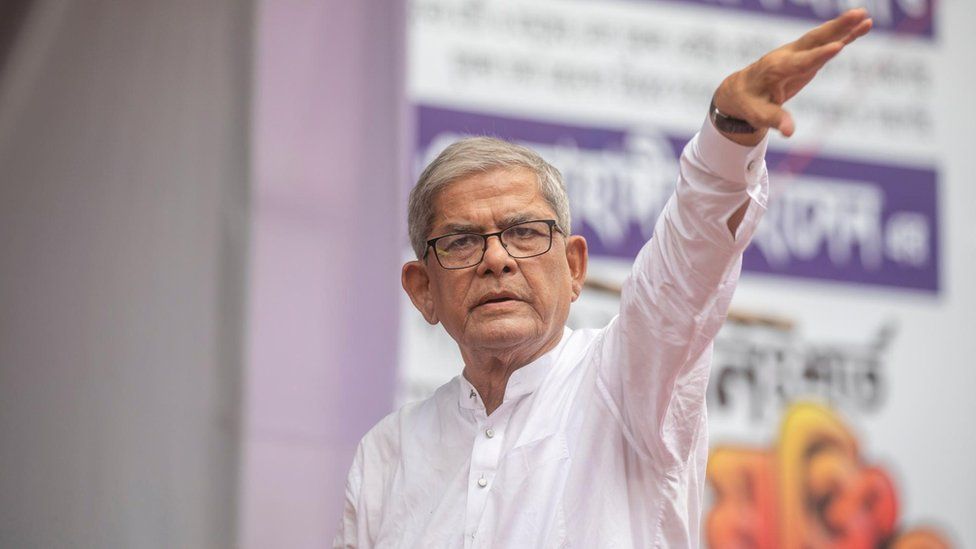 EPA
EPABangladesh’s opposition leader and dozens of members of his party have been arrested after violent anti-government protests in Dhaka.
Mirza Fakhrul Islam Alamgir, secretary general of the Bangladesh Nationalist Party (BNP), is among those facing charges, an official said.
Tens of thousand of protesters turned out over the weekend, calling for Prime Minister Sheikh Hasina’s resignation.
One police officer was killed, as well as at least one protester.
There are conflicting reports of why Mr Alamgir, 75, was arrested.
Local media report that he was detained for an alleged attack on the home of Bangladesh’s chief justice.
But AFP news agency said he was charged, along with 164 other BNP members, with murder following the death of the police officer at Saturday’s protest.
Police said the officer had been hacked to death, and accused BNP activists of the killing.
Protesters and police clashed again on Sunday in multiple locations. Dozens were injured.

Mr Alamgir has led the party since chairwoman and former prime minister Khaleda Zia was arrested and jailed for five years on corruption charges.
With elections expected in January, the BNP has been holding protests against Ms Hasina, calling for her to stand down and for a vote to be held under a neutral government.
BNP party spokesman Zahir Uddin Swapan said nearly 3,000 party activists and supporters had been detained in the past week, while Dhaka police said at least 1,480 opposition activists had been arrested and charged with violence since 21 October.
They include nearly 700 people arrested during Saturday’s protests.
Ms Hasina – the daughter of Bangladesh’s first president – has been in power since 2009, and has been accused of targeting activists and political opponents, which she denies.
Bangladesh’s politics has long been dominated by a feud between Ms Hasina and Ms Zia, who have both served as prime minister.
Related Topics
-
-
6 January 2015

-
-
-
15 September

-
Weapons seized from man seen using samurai sword in video

SINGAPORE: The police arrested a man and seized several weapons after he was seen using a samurai sword in a video posted on social media.
Other weapons – a butterfly knife, a flick knife and a knuckle duster – as well as drug paraphernalia were discovered and seized when the police raided the man’s home.
“On Oct 28, 2023, the police received a report of a video posted on social media showing a man wielding a samurai sword in public. Preliminary investigations revealed that the video was uploaded on the man’s social media page,” the Singapore Police Force (SPF) said in a news release on Sunday (Oct 29).
In a video posted on Facebook, the man said he wanted to “test how sharp” the sword was, before slicing a bottle in half.
Police officers established the identity of the man and arrested him at a residential unit along York Hill, which is located off Chin Swee Road.

